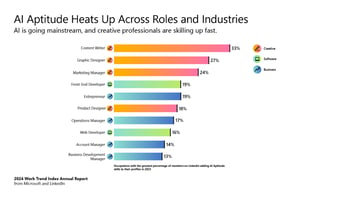The ‘2024 Work Trend Index Annual Report’ from Microsoft and LinkedIn has a powerful message for...
The Learning Questions
In the bustling city of Progressville, there existed a company known for its innovative solutions and ambitious goals. The company was led by Manager Mira, a competent yet stern leader, renowned for her meticulous attention to detail. However, Mira had a habit that cast a long shadow over her team's spirit: whenever an employee made a mistake, she would scold them, her words sharp as a blade.
As time passed, the atmosphere in the office grew tense. The employees, once eager beavers, became timid and hesitant. Decisions were delayed, creativity stifled, and the vibrant buzz of collaboration dimmed to a fearful whisper. They were afraid of making mistakes and facing Mira's wrath.
Enter Coach John, a wise business strategist with a knack for nurturing high-performing teams. He was hired by Suzanne, the company's HR manager, who noticed the dwindling morale. Coach John, with his years of experience in business strategy coaching and a deep understanding of human psychology, observed the situation with a keen eye.
He called a meeting with Mira and gently introduced the concept of 'Learning Questions,' a method to transform mistakes into learning opportunities. He explained:
Ask About the Decision: "When an employee errs, ask them about the decision they made at that time. It's crucial to understand their perspective without judgment."
Reflect on the Aftermath: "Encourage them to reflect on what they've been thinking since making that decision. It's a way of self-assessment and growth."
Consider the Impact: "Have them analyze who was impacted by their decision. This builds empathy and understanding of their actions in the team's context."
Seek Remedial Actions: "Discuss what can be done to rectify the situation. It's about taking responsibility and learning to mend the effects of their decisions."
Extract Lessons: "Finally, ask what they've learned. This turns a mistake into a stepping stone for improvement."
Mira, initially skeptical, agreed to try this approach. The next day, when a young employee named Alex made a significant error in a report, the office braced for the usual storm. But instead, Mira's approach was different. She sat down with Alex and walked through the Learning Questions.
As weeks turned into months, a transformation swept through the company. Mira's meetings with her team members, once dreaded, became sessions of growth and understanding. The employees, now confident and supported, began to take initiative, their fear of reprimand replaced by a desire to learn and excel. Creativity flourished, and the office once again buzzed with energy and collaboration.
Suzanne watched this transformation with pride. Under Coach John's guidance, she had helped steer the company back to its core values of growth, learning, and teamwork. The employees were not just working; they were thriving, innovating, and most importantly, they were unafraid to make decisions.
The company's progress skyrocketed. It wasn't just about avoiding mistakes anymore; it was about growing from them. Mira, once a feared manager, became a respected mentor. The employees, who had once walked on eggshells, now strode confidently, knowing that their growth was a priority.
And thus, the company in Progressville became a beacon of high performance and employee satisfaction, all thanks to the wisdom of Coach John and the adaptability of Manager Mira. The Learning Questions not only transformed the way mistakes were handled but also redefined the very ethos of the company, turning a place of fear into a hub of continuous learning and support.
In this fable of transformation, the key takeaway is clear: Embracing mistakes as learning opportunities can unleash the true potential of a team, fostering an environment where innovation, growth, and confidence thrive.





